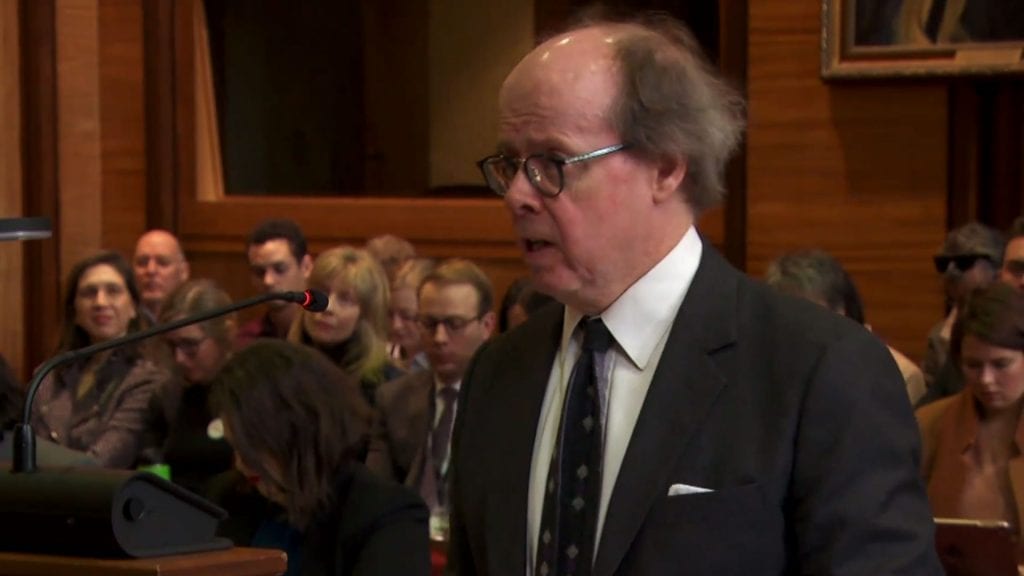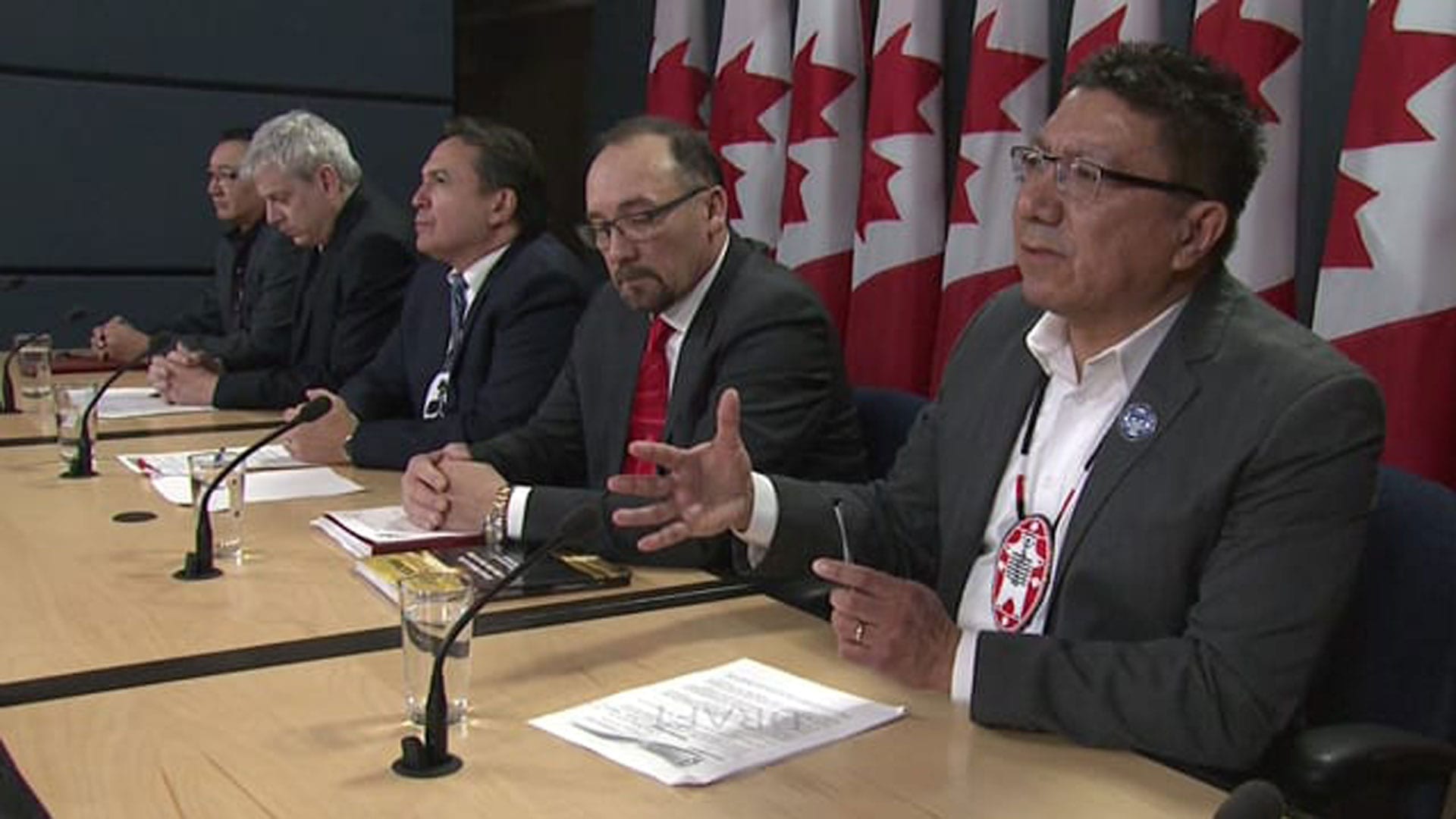
Robert Frater argued, unsuccessfully, the compensation order should be paused in 2019. Photo: APTN
A top Justice Department lawyer forged ahead Wednesday with Canada’s argument that the Canadian Human Rights Tribunal didn’t have enough evidence of “real harm” to award compensation to victims of Ottawa’s intentionally underfunded First Nations child-welfare system and refusal to pay for essential services.
Chief general counsel Robert Frater was undeterred after the Assembly of First Nations (AFN) and the First Nations Child and Family Caring Society (Caring Society) slammed his arguments on Tuesday.
“Assertion is not evidence. Our contention in this case is that the tribunal simply asserted, repeatedly, that the evidence was considerable,” he argued. “We do not dispute that there was lots of evidence. Our contention is that it was aimed at showing the funding system was broken and had to be fixed: It is being fixed.”

Today was Frater’s last chance to convince Federal Court Justice Paul Favel to agree with these contentions. In 2019, the tribunal awarded the maximum allowable amount of $40,000 to thousands of kids and families whose basic human rights were violated by the state.
The panel ruled Canada’s underfunding of child welfare and refusal to enact Jordan’s Principle wilfully and recklessly discriminates against First Nations kids on reserves and in the Yukon.
Canada wants Favel to quash this ruling or send it back to a tribunal with new panel members. It’s being opposed by a half dozen First Nations and human rights organizations who presented Favel with a united front this week.
‘Tragedies at Wapekeka’
Akosua Matthews, lawyer for Nishnawbe Aski Nation (NAN), told the court it need look no further than the “tragedies at Wapekeka,” which the tribunal dealt with at length, for evidence of real harm.
Wapakeka is small northern Ontario First Nation and NAN constituent. In 2016 it alerted Health Canada to a suicide pact some children and youth had made. The community proposed a preventative mental health strategy and sent it off to Ottawa seeking cash.
Canada received the proposal two months after it was submitted and only responded after two youths took their own lives. The proposal came at an “awkward time in the federal funding cycle,” according to tribunal evidence from 2017.
The tribunal panel relied on this evidence in their decision to award compensation.
“This delay was intentional and justified by Canada according to financial and administrative considerations,” the panel said. “It was devoid of caution and without regard for the serious consequences on the children and their families.”

Matthews said these discriminatory systems cause harm by placing First Nations kids at risk of apprehension or at risk of suffering denial or delays when trying to access essential services.
“In some cases, the risk can result in death — as it did in Wapekeka,” said Matthews. “Wapekeka was a worst-case scenario, but First Nations children did not have to die to receive the maximum award.”
Matthews wrapped up her arguments by joining the other respondents in laying into Ottawa for its decision to fight in court.
“It’s remarkable that we’re even before you on these judicial review applications by Canada, especially given the fact that, politically, Canada has stated that they are not litigating against First Nations children,” she told Favel. “But I would submit, your honour, that these judicial reviews represent exactly that.
“And it’s because of that that NAN, alongside the Caring Society and the AFN, also seeks the dismissal of Canada’s application regarding compensation in its entirety, with costs.”
Watch NDP demand response to ongoing litigation:
The Caring Society and AFN said Canada’s conduct and arguments were callous, heartless, paternalistic and colonial.
They criticized Ottawa for conducting a back-door assault on tribunal decisions handed down between 2016 and now, suggesting Canada could have appealed earlier if it believed it wasn’t getting fair treatment.
Frater blasted back against these points in his reply arguments.
“This is a point that was made repeatedly by my friends and is not a strong one,” he said. “Ironically, we are criticized as heartless and callous for bringing these judicial reviews — and now criticized, justice, vociferously, for not reviewing the prior decisions.
“Far from collaterally attacking them, we spent billions implementing them.”
Case is ‘blazing a trail,’ says human rights commission
Favel, a Poundmaker Cree Nation member appointed to the bench in 2017, listened intently throughout the proceedings and rarely interrupted the attorneys.
He did, however, latch on to one of the Canadian Human Rights Commission’s arguments which said, “While aspects of the decisions may be bold, extraordinary violations of the CHRA (Canadian Human Rights Act) appropriately call for extraordinary remedies.”
Favel asked the commission’s lawyer to explain what it meant by the word “bold.”
Presumably, federal administrative tribunals aren’t supposed to be bold, but rather predictable in applying and adhering to the statutes that give them power. Canada’s main argument is that the tribunal reached far beyond the jurisdiction and authority granted it by the human rights act.
The commission’s counsel Brian Smith explained that by bold the commission simply meant unprecedented.
“This is a case, frankly, unlike cases that have come to us in the federal human rights system in the past. It won’t be the only one. It’s blazing a trail. But that’ll be for later,” he said.
“Somebody has to go first sometimes to develop the principles that are needed to ensure that human rights justice is done. And that’s what I mean when I talk about this case being bold.”
Read More:
AFN lawyer rips Ottawa’s ‘callous’ and ‘heartless’ arguments on day two of judicial reviews
The human rights commission is an arms-length government institution that receives and investigates complaints of discrimination. In 2008, the commission referred the Caring Society and AFN’s complaint about systemic underfunding to the tribunal for a hearing.
When that happens, explained Smith, the commission becomes a party to the litigation, and so it’s been involved in this case for 14 years running.
He said the commission took no position on what compensation should be awarded or to whom. However, the commission argued the order itself was reasonable, and it joined the other organizations in urging Favel to dismiss Canada’s application in its entirety.
“This is a systemic case of racial discrimination relating to real harms caused to First Nations children, families and communities by the government of Canada,” said Smith. “We look at this case as affording an opportunity to promote reconciliation between the Crown and First Nations peoples.”
Amnesty International also argued in favour of upholding the compensation order, leaving Canada standing alone against a broad wall of opposition.
Some of that opposition is political.
On June 7, Parliament unanimously passed a legally non-binding NDP opposition motion demanding Ottawa drop these appeals — a vote from which Prime Minister Justin Trudeau, his cabinet and some of their lieutenants on the backbench abstained.
The motion demanded the Liberals produce a report within 10 days laying out their actions in response.
That deadline is Thursday, NDP Leader Jagmeet Singh told reporters at a news conference in Ottawa.
Canada also begins its second judicial review on Thursday of a different tribunal decision issued in 2020, which ordered Canada to apply Jordan’s Principle to some non-status kids.









